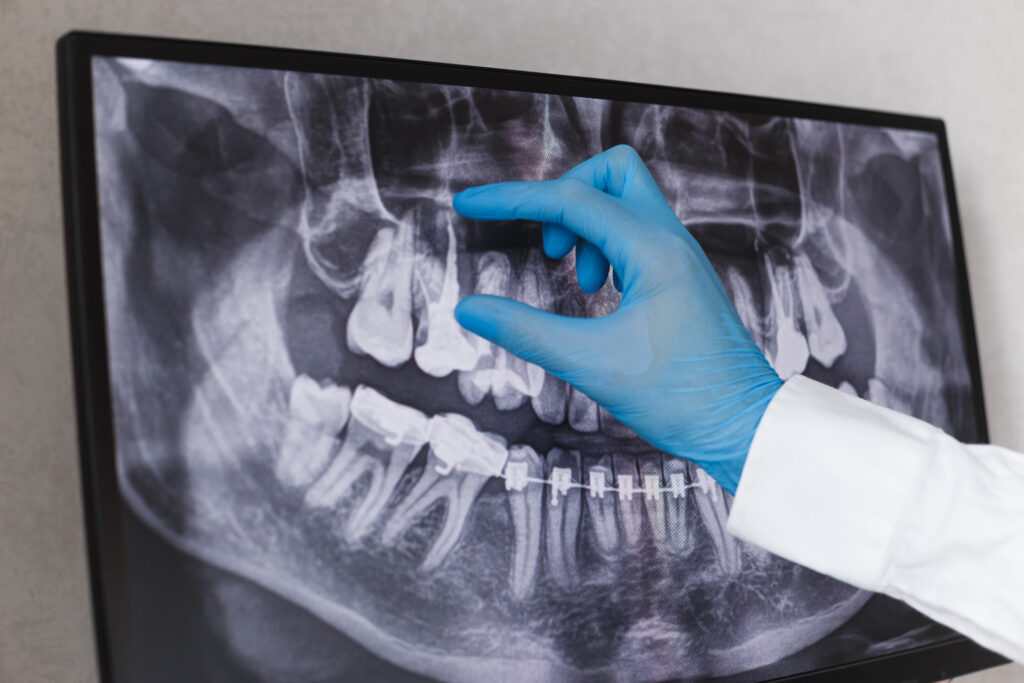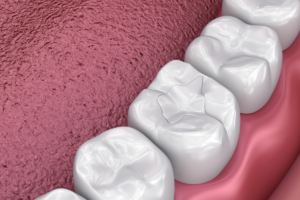The curve of a smile has the power to set things straight, and a perfect smile with a set of white pearly teeth, is a showstopper. That is why, perhaps, that when a tooth is lost, it causes more than just a gap in your smile; it drains your self-confidence, and makes you super conscious about your social image. You may have experienced social concerns about embarrassing smiles and wondered if you could still enjoy generating your big, hearty smiles when your teeth are less than perfect, or if you are missing a tooth here and there.
But it’s not just about self-esteem and social image. A number of factors such as diseases, decay, or natural aging process can contribute to tooth loss, all of which need immediate medical attention. The loss of a tooth itself can lead to severe long-term concerns in your oral health, causing headaches, irreversible jawbone loss, an imbalanced bite, chewing difficulty, and inability to speak clearly.
You can settle for removable partial dentures, or benefit from dental bridges. However, the long-lasting solution is believed to be ultra-biocompatible implants, which are the perfect alternative to dentures or bridgework. A dental implant surgery can help you overcome physical concerns while improving your self-confidence. The development of virtual planning has made this surgery a more accurate process for cosmetic dentists, and a more pleasurable experience for the patients.
Computer-Guided Implant Surgery
Virtual dental implant planning allows for the best esthetics, thanks to computerized tomography and interactive software, which have proven to be quite advantageous to oral surgery by guiding the process precisely toward a specific target.
Computer-assisted surgeries comprise a set of techniques that use computer technology for surgical planning, guiding, and performing.
In guided surgery cases, CT scans and digital images are used to develop a virtual miniature of the patient’s jaw and oral anatomy. The goal is to develop a digital treatment plan in which the exact position of the implant is determined prior to the treatment.
Computer-guided implant surgery has delivered several advantages to dentists, allowing them to visualize images of the patient’s jawbone and the surrounding tissue to precisely plan the procedure and achieve predictable implant placements. This method employs the images from a cone-beam X-ray or scanner, which reveal the vital structures, the root anatomy, and the proximity of neighboring teeth.
According to a study, patients who have undergone computer-guided implant surgery employing a surgical template, have higher satisfaction rates than those who have undergone the conventional one.
How does computer-guided implant surgery differ from conventional implant surgery?
Computer-guided surgery, with its visualization capabilities, offers a more precise implant placement, whereas traditional surgical guides tend to be riskier as they lack the anatomical references. The detailed treatment planning in computer-guided implant surgeries helps reduce unexpected issues or complications during surgery, and decrease the required time for performing the treatment.
Despite the undeniable advantages of guided implant surgery, you can still successfully maintain the implants you got through the conventional implant method for years or even decades.
What advantages does computer-guided implant surgery hold?
Benefiting from the modern technology, computer-guided surgeries can be quite beneficial in certain situations, such as when:
- You require more than one implant to be placed sequentially;
- You require extraction followed by immediate implant placement;
- An immediate prosthesis should be manufactured before implant surgery;
- The implant placement is essential for the success of a proposed restoration;
- There are issues concerning the proximity of existing implants or adjacent teeth; and
- You face problems with the structure of your bone and require significant alteration of bony anatomy.
Accuracy: The main reasons for selecting guided implant surgery are the accuracy of implant placement and prevention of damage to vital anatomical structures by using computerized software.
Pain relief: This technique can reduce pain and post-operative discomfort.
Involvement: Last but not least, this method allows you to become more involved in your treatment plan and comprehend the possible choices and potential risks, while foreseeing the predicted outcome.
What are the main types of computer-guided implant surgery?
There are two different arrangements of guided implant surgery protocols:
- Static approach: A tissue-supported surgical template is utilized in static guided surgery. The virtual implant position is reproduced directly from the converted tomographic data, which are used to guide templates during the process.
- Dynamic approach: Guided surgery produces the virtual implant position from computerized data and guides the implant osteotomy preparation with the help of motion-tracking technology.

Dental Implants
Dental implants are still relatively new dental works in progress, aged about thirty years. However, they have delivered outstanding results in comparison to their denture predecessors. They allow you to recover normal physical function, impart psychological well-being, and sport a friendly smile with confidence.
The treatment may involve several procedures, requiring months to be applied and completed. If you are not suffering from severe health conditions, this method can be the proper treatment, whether for a single, multiple, or a full set of missing teeth.
Dental implants are composed of three components working all together to replace the lost teeth: the implant itself, an abutment, and a porcelain crown.
What benefits do dental implants deliver?
- Natural fit: Dental Implants are the only known cosmetic dental options that stimulate natural bone growth and prevent bone loss;
- No diet restriction;
- Long-lasting outcomes: Dental implants can last a lifetime with proper care;
- Improved facial features;
- Preserved facial structure;
- High success and survival rate: They have a success rate of up to 98%, according to a retrospective study by BMC Oral Health.
Who is a good candidate for dental implants?
Almost anyone with missing teeth can benefit from this procedure if they are unwilling to wear dentures. If you believe you can commit to your treatment for several months, this surgery could be the best option. However, it functions only if:
- You have a fully-grown jawbone;
- Your bone is adequate to securely hold the implants; and
- Your oral tissues are healthy.
How old is too old for dental implant surgery?
No age is too old for dental implant surgery. A reasonably healthy person with even a few years of life expectancy can safely undergo the procedure. Dental implants work just as effectively in older patients as in younger ones, changing the lives of the former for the better, giving them more confidence and improved physical and mental health.
How to choose between dental implants and dentures?
Dentures continue to be the perfect tooth replacement method for many people, but since the advanced technology has offered better possibilities, dental implants got the opportunity to become the ideal solution for replacing missing teeth.
Not only can they stand the test of time better than dentures, but:
- They do not harm your jaws, being placed surgically in your jaw just like a natural tooth root;
- They help to prevent gum recession, which is a common concern with dentures;
- They restore your chewing function because of their stability;
- They look natural and can be customized to integrate with your smile; and
- They stabilize restorations to keep them from unexpected moving.

What materials are dental implants made up of?
Dental implants are made of biocompatible materials, which will be placed in your jaw. Some of these implants are made of alloyed metal titanium that can connect to your jawbone; others are made of zirconia, which is a metal-free material, offering an ultra-biocompatible ceramic implant root.
How long does it take to get an implant?
The process of completing a dental implant does take time, as it needs to blend seamlessly with your smile and naturally integrate with your bone, all of which may take four to six months.
What procedures does the treatment involve?
Dental implant surgery is a technique employed to overcome oral issues replacing damaged or missing teeth with artificial ones. This dental procedure is performed in the following steps, with recovery periods:
- Removing the damaged tooth
- Preparing the jawbone
If your jawbone is not thick enough to support the implant, you will need bone grafting before the surgery. Generally, bone grafting takes several months, but you may only need a minor one done at the same time as the implant surgery.
- Placing the dental implant
You will get a cut in order to expose the bone, into which holes will be drilled to place the dental implant metal post.
- Waiting for the bone to grow
Once the implant post is set, the jawbone grows into the surface of the dental implant to perform as roots for your natural teeth.
- Placing abutment
The abutment is the piece on to which the crown will eventually attach, requiring a minor placement surgery in an outpatient setting. Your gums must heal for about two weeks before the artificial tooth can be attached.
- Placing the crown
The crown will be placed once your gums heal and your jawbone is prepared. Your artificial teeth can be removable, fixed, or a combination of both. Removable artificial teeth are similar to removable dentures, containing artificial white teeth surrounded by pink gum mounted on a metal frame. Fixed artificial teeth are, as the name suggests, permanently tightened to the implant abutment.
What are the different forms of dental implant placement?
Dental implants can be placed through different approaches considering whether you have a stable jaw bone or not:
- Endosteal implants are surgically inserted deep into the jawbone, taking the place of tooth roots.
- Subperiosteal implants are inserted under the gum but not drilled into the jawbone.
What are the potential risks of dental implant surgery?
Dental implant surgery is a safe and effective method that will significantly improve the quality of your overall health after experiencing complications of tooth loss.
Like any other surgery, however, this procedure may have some health risks, though rare, including:
- Pain and numbness in teeth, gums, lips, or chin;
- Injury to surrounding structures;
- Infection at the implant site; and
- Sinus issues.
How to prepare for the treatment?
Various specialists may participate in scheduling a dental implant treatment, since it requires one or more surgical procedures. The treatment plan will be tailored to your needs, considering your oral condition after reviewing your medical history and taking your dental 3D images.
Some form of anesthesia will be used during surgery so as to ensure that you are comfortable, and you will be given post-operative instructions afterward.
What is Post-treatment advice?
You may experience some typical discomforts associated with this type of dental surgery, such as swelling, bruising, pain, or minor bleeding at the implant site. Therefore, you should take certain pain medications or antibiotics after the surgery, and have soft foods while the surgical site heals. To prolong the results, you should:
- Keep implants and artificial teeth clean, using specially designed brushes;
- Schedule dental checkups to ensure the proper functioning of your implants; and
- Avoid chewing hard foods, tooth-staining tobacco, and consuming caffeine products.
How long will the results last?
Your dental implant can last a lifetime with regular oral care, assuming you receive regular checkups. The crown, however, may need a replacement due to natural wear and tear.
How long the results of a dental implant surgery will last differs from person to person, and is determined by various factors, including the amount and quality of the existing bone, the type of restoration, personal hygiene or maintenance program, and life habits.
What happens if computer-guided implant surgery fails?
Dental implants have a high success rate, and a failed dental implant is an unusual occurrence. However, just like any other implants, they too have the potential to fail.
Early failure of dental implants happens several months after the procedure, as a result of various factors such as poor blood circulation or allergic reactions. Late implant failures may occur due to smoking, poor dental hygiene, or lack of gum tissue. You may also experience long-term implant failure when osseointegration does not happen.
Osseointegration is a biological process that allows your body to produce bone cells around the implant surface.
It is possible to save your failing implant with the help of modern technologies such as dental lasers.
The LAPIP protocol is one of the best solutions for this problem. There are numerous reports on a large number of failing implants that have been saved with this technique.
What is the best option for replacing a missing tooth?
Your smile makes not the first but the last impressions. Computer-guided implant surgery combines art and science to provide you with the smile you deserve. The procedure, though surgical, is safe and relatively painless. Nonetheless, before you decide on going for dental implants, a consultation with a dentist is in order. The treatment plan should meet your expectations, and cater to your dental needs and desires.
If you want to spend more on yourself and less on your dentists, Aria Dental is the right place you cannot wait to tell your community about. Benefiting from the tomorrow of dentistry, we offer excellence with optimum care, deliver patient-friendly solutions to your dental concerns, and pave the way for your pleasing experience of beating them.



















